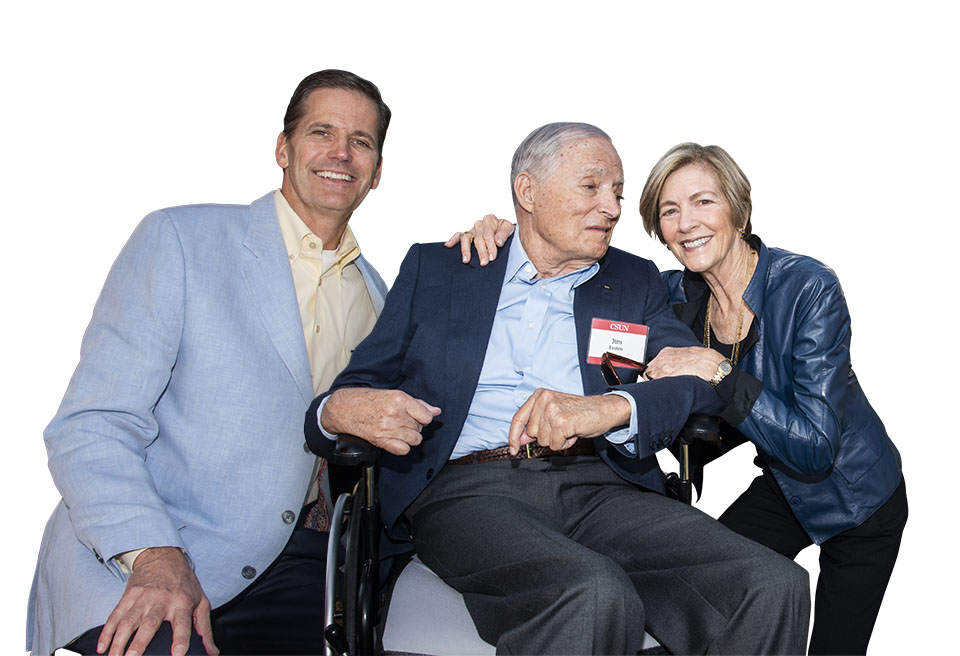Manufacturing Systems Engineering and Management Professor Maryam Tabibzadeh Conducts Research on Surgical Safety and Cybersecurity.

Pictured, L-R: In 2018, Greg Easton, James L. Easton and Phyllis Easton celebrate the creation of a fellowship in CSUN’s College of Engineering and Computer Science and a new archery range on campus, through a gift from the Easton Foundations. Photo by Lee Choo.
By Olivia Herstein
In 2018, the Easton Foundations made a grant of $1.5 million to CSUN, much of which helped establish the Easton Foundations Fellowship in Engineering at the university.
The sporting goods manufacturing company Jas. D. Easton, Inc., has had a decades-long relationship with CSUN — from offering students hands-on training through internships to its staff working alongside faculty to investigate and solve many materials engineering challenges.
Easton took the relationship to the next level with the $1.5 million gift from its philanthropic arms — the Easton Foundations — for the creation of an endowment for engineering faculty. Money from the gift also is being used to bolster resources for the Olympic-style sport of archery on campus.
“CSUN and Jim Easton have had a long relationship of collaboration and research. The Easton values of excellence, innovation and quality were always a part of Jim Easton’s philosophy for the company, and as an engineer, he enjoyed working together with the engineers from CSUN on a variety of projects,” said Caren Sawyer, executive director of the Easton Foundations, in a joint statement with Greg Easton, Foundations president and Jim Easton’s son. “Jim also enjoyed supporting CSUN as a local school in the heart of the San Fernando Valley.
“He moved the company roots for Easton Aluminum to Van Nuys in the 1960s and was pleased to be able to team with the professors, staff and students at CSUN to share and discuss new ideas as the company grew,” they continued. “The Easton Foundations, which was created in 1982 to support the Olympic effort in the sport of archery, is proud to continue the relationship with CSUN, with the innovation and creativity that is inherent in their engineering department and the school.”
During the 2019-20 academic year, the very first fellow benefiting from this generous gift to CSUN was Maryam Tabibzadeh, professor of manufacturing systems engineering and management. The Easton Foundations Fellowship supported Tabibzadeh’s research in spring 2020, as well as funding to support her graduate student assistants. In their research, the team focused on developing a proactive risk assessment framework to enhance patient safety in operating rooms, primarily preventing surgical tools and other objects left inside patients’ bodies after surgery — or in hospital parlance, “unintended retained foreign objects,” a major cause of post-surgical complications and death.
Tabibzadeh and her team collaborated with experts from The Joint Commission, the nation’s oldest and largest health care nonprofit for setting standards and accreditation, and the Keck School of Medicine at USC. Their research findings showed that these objects are not the fault of tech failures, nor of surgeons and their teams, but rather caused by several interdependent factors and decision makers including staff, management, hospital organizations and government and regulatory bodies.
“We observed different operating rooms (earlier in 2020),” Tabibzadeh said. “It was my first time being inside an operating room! We looked at teamwork, and things like how the hierarchy of power would impact the whole process in general. We looked at the way surgeons behave, the way they address their team and how they cooperate with the anesthesiology team.
“We had looked at a 2000 report from the National Academy of Sciences Institute of Medicine, and the number of deaths due to medical errors in the health care industry was really shocking (according to one study, potentially up to 98,000 deaths annually) — and how preventable they might be,” she continued. “As for the unintended retained foreign objects specifically, they are the most common sentinel event in health care settings, according to The Joint Commission.” (The commission defines a sentinel event as any unanticipated event in a health care setting that results in death or serious injury.) “That was really a turning point for me. I thought, ‘maybe I can do something to really contribute to reducing these.’”
She and her team made a number of initial recommendations, to help prevent those errors in operating rooms, including: improving government regulatory infrastructure in the health care industry, and improving continuous learning for hospital personnel, on safety of operations and quality of care.
Tabibzadeh also attended two prestigious conferences related to her research focus and background: Human Factors and Ergonomics Society Healthcare Symposium and the Applied Human Factors and Ergonomics conference. She presented her preliminary research findings at both conferences.
“We hope to be able to move forward and get data from The Joint Commission, and adjust our model to be more data-informed,” Tabibzadeh said. “I’m really thankful to be the first Easton Foundations Fellow.”
During her fellowship, Tabibzadeh also conducted a second research project with another graduate student, developing a framework to analyze insider threats such as cybersecurity incidents. They found that insider threats are generally not the result of tech malfunctions or human errors, but the result of multiple contributing factors such as workplace culture, training and management.
“From cybersecurity to health care, the range of Dr. Tabibzadeh’s research is impressive,” Sawyer and Easton noted. “During this time of intensive focus on health care, Dr. Tabibzadeh’s research into patient safety and unintended retained foreign objects is unquestionably important. Both projects are timely and valuable, and we look forward to hearing more about Dr. Tabibzadeh’s research in these and other health care- and technology-related areas.”
Tabibzadeh’s research has been focused on risk analysis in complex, safety-critical and technology-intensive industries such as oil and gas drilling, transportation and healthcare. Her areas of research interest include risk analysis and risk management, safety management, incident investigation, decision analysis, safety culture, and human and organizational factors.
